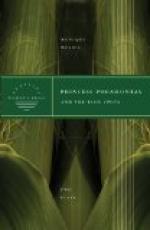Several times during the night she was half awakened by the sound of some young animal crying—perhaps a bear cub, she thought sleepily, but even were the mother bear nearby she had no fear of her.
Later on she dreamed that the mother bear had come into the cave and was sniffing her all over. She opened her eyes and saw the glow from the embers reflected in a pair of eyes above her.
“Go away, old Furry One!” she commanded drowsily. “I’m not afraid of thee. Be off and let me sleep.”
But the sound of her own voice wakened her and she raised herself to a sitting position to see whether the bear were obeying her. Against the almost extinguished embers she saw the dim outlines—not of the beast she expected, but of a human being! She sprang up, seized hold of it with her right hand before the other had time to escape, and with her left hand caught up some dried twigs and threw them on the remains of the fire. The wood already heated, ignited at once; the blaze lighted up the little forest room and Pocahontas beheld—Wansutis!
“Where is my child?” cried Pocahontas. “What hast thou done with him? And so it was thou who alone in all the world didst dare steal him from me. What hast thou done with my son? Speak!”
The old woman did not struggle under the firm grasp of the young strong hands. She stood still as if alone, staring into the flames that reddened the circle of trees as if they had been stained with blood.
“What hast thou done with my son?” cried Pocahontas again.
“What hast thou done with my son?” asked the old woman, without turning her head to look at Pocahontas.
“Thy son! Claw-of-the-Eagle? Why! I sent thee word many moons ago, Wansutis, that he was dead.”
“Hadst thou loved him he had not died.”
“I loved him as a sister, Wansutis; my fate lay not in my hands. But Claw-of-the-Eagle is dead, and we mourn him, thou and I”—here she loosened her grasp on the old woman’s shoulder, “but my son is alive unless—”
Here a dreadful possibility made her shake like an aspen.
“What hast thou done with my son, Wansutis? What didst thou want with him?”
Wansutis, who was now crouched down looking at the heart of the fire, began to chant as if alone:
“Wansutis’s son died in battle. No stronger, fiercer brave was there in all the thirty tribes, and Wansutis’s lodge was empty and there was none to hunt for her, to slay deer that she might feed upon fresh meat. Then Wansutis saw a prisoner with strong body, though it was yet small, and Wansutis had a new son, a swift hunter, whose face was ruddy by the firelight, whose presence in her lodge made Wansutis’s slumbers quiet. And this son wanted a maiden for his squaw and went forth to play upon his pipes before her. But the maiden would not listen and the river and the maiden killed the brave son of Wansutis, and again her lodge was lonely.”




